#best stomach hospitals
Text
When To Get Operated For Gallstones?
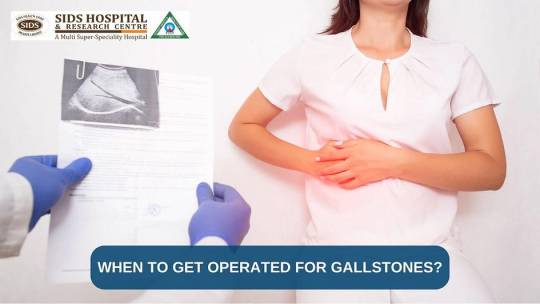
Gallstones are a common health issue that affects millions of people worldwide. These small, solid particles can form in the gallbladder and lead to a variety of symptoms, ranging from mild discomfort to severe pain. When faced with gallstones, many individuals wonder if and when they should opt for surgery. Let’s understand the factors from our expert gastro surgeon, to determine the right time to visit us at SIDS hospital, the best gastro hospital in Surat for gallstone surgery.
What Are Gallstones?
Gallstones are hardened deposits that can develop in the gallbladder, a small organ located just beneath the liver. The gallbladder plays a crucial role in the digestion process by storing and releasing bile, a fluid that aids in breaking down fats. When the balance of substances like cholesterol, bilirubin, and bile salts in the gallbladder is disrupted, gallstones can form.
Gallstones can vary in size and composition, from tiny pebble-like stones to larger, more solid ones. There are two main types of gallstones:
1. Cholesterol gallstones: These are the most common type and form when there is an excess of cholesterol in the bile. Cholesterol gallstones are typically yellow-green in colour.
2. Pigment gallstones: These stones are smaller and darker and form when there is an excess of bilirubin in the bile.
Gallstone Symptoms
Not everyone with gallstones experiences symptoms. In fact, our specialists at SIDS hospital, one of the best stomach hospitals in Surat, have seen many people suffering from gallstones without being aware of them because they are “silent.” However, when gallstones do cause symptoms, they can be quite painful. Common symptoms of gallstones include:
1. Biliary colic: This is a severe, cramping pain in the upper right or middle abdomen, typically lasting for at least 30 minutes. It may be accompanied by nausea and vomiting.
2. Acute cholecystitis: Inflammation of the gallbladder can cause persistent pain, fever, and tenderness in the abdomen. This condition often requires prompt medical attention.
3. Choledocholithiasis: When a gallstone becomes lodged in the common bile duct, it can lead to symptoms like jaundice (yellowing of the skin and eyes) and pancreatitis.
4. Cholangitis: This is a severe infection of the bile ducts and can cause symptoms like fever, chills, and right upper abdominal pain.
When to Get Operated for Gallstones?
As one of the best hospitals in Surat for various surgical procedures, SIDS Hospital recognizes the intricacies involved in determining the optimal timing for gallstone surgery. This decision is influenced by multiple factors, and we would like to highlight some essential considerations:
1. The presence of symptoms: If you are experiencing symptoms related to your gallstones, such as biliary colic, acute cholecystitis, or complications like choledocholithiasis or cholangitis, surgery may be recommended. Symptomatic gallstones often require intervention to alleviate pain and prevent further complications.
2. Frequency and severity of symptoms: The frequency and severity of your symptoms are important determinants. If you frequently experience intense pain or have recurrent episodes of gallbladder inflammation, surgery may be the best option to prevent ongoing discomfort and potential complications.
3. Personal preferences: Your personal preferences and values play a significant role in the decision-making process. Some individuals may opt for surgery at the first sign of symptoms to avoid future complications, while others may choose a more conservative approach. It’s important to have an open and honest discussion with your healthcare provider about your preferences and concerns.
4. Age and overall health: Your age and overall health can impact the decision. Younger, healthier individuals may be better candidates for surgery, whereas older individuals or those with significant comorbidities may need to weigh the risks and benefits more carefully.
5. Complications: If your gallstones have led to complications such as pancreatitis, obstructed bile ducts, or severe infections, surgery is often necessary to address these issues promptly. Ensure that you reach out to the best hospital in Surat to avoid more complications.
6. Expectation of recurrent symptoms: If you and your healthcare provider believe that your gallstone symptoms are likely to recur and become more severe, surgery may be recommended as a preventative measure.
Can Gallstone Surgery be Prevented?
Gallstone surgery cannot be prevented for individuals with a high risk of gallstones or those who have already experienced symptoms.
However, it is advisable to adopt a healthy lifestyle and make dietary choices that reduce the risk of gallstone formation. Maintaining a balanced diet that is rich in fiber, low in saturated fats, and cholesterol that helps to keep a healthy weight, along with regular physical activity can help in reducing the likelihood of gallstones.
Conclusion
The decision of when to get operated for gallstones depends on the presence and severity of symptoms, personal preferences, overall health, and the potential for complications. If you are unsure about whether or when to undergo surgery for your gallstones, it’s crucial to consult with a healthcare professional who can assess your specific situation and provide guidance tailored to your needs. Ultimately, the goal is to alleviate your symptoms, prevent complications, and improve your overall quality of life.
0 notes
Note
Take as much time as you need. If possible call a friend or someone close to you so you could spend time with someone understanding and calm and patient. Or with some animals. Anything that can calm your mind down or bring you serotonin. Please don't close yourself in a room without contact (I mean contact with friends not contact here with internet strangers). If you need a long break - do it. If you need to stop posting at all and disappear from the internet forever - do it. Your health - mental and physical - is much more important than strangers' pleasure.
Take care of yourself gently, please.
Well… I don't know what to say at this point. Some of you said via dm that you even thought I would commit suicide. So I'm just sorry if i scared you guys or something!That wasn't my purpose. I just felt like I needed a little time alone, that's all. Also if there are those who follow my instagram, I made some updates to my story from time to time during this period. But despite that I apologize to whoever i have seriously worried!
I appreciate the way you think and all your kind words. I've already tried to talk/spend time to people I feel comfortable with and solve questions that I need to know the answers to… but still don't know if i can say "I'm totally alright" now. I mean i'm not sure if it works, or maybe i need some more time idk…
I just want you guys to know that I read all the comments/dms even though i couldn't answer them all. So all i can say is… Thank you for your love and support throughout this period!I truly appreciate your understanding!!🙏❤️
#Btw I'm trying to take care of myself gently but…#…i think i got poisoned from something i ate yesterday and at 2am suddenly i started vomiting…#…if my stomach hadn't calmed down we would have gone to the hospital in the middle of the night but I'm ok now#and I didn't say that for you guys to worry pls i just mean that i'm trying my best 🙃 (if you believe me x))#Thank you again!#text post
19 notes
·
View notes
Text
given the adominal issues of it all... i do have to concede that if kate middleton is as bloated as i am right now then i get it. do NOT capture my image!!!!!!
#because... i'll tell you... i would not want to be pictured in my condition even weeks post hospital.but then again the best doctors are not#necessarily on my case....#am i going to get shot.#idk it's just weird because we were both in the hospital for our stomachs at similar times...which means... i'm the princess of the world.
2 notes
·
View notes
Text
Understanding Hemorrhoids Causes, Symptoms, and Treatments
Hemorrhoids, also known as piles, are swollen veins in the lower rectum and anus, similar to varicose veins. They can cause discomfort, pain, and bleeding. Hemorrhoids are a common condition, especially in adults aged 45 to 65. This article aims to provide a comprehensive understanding of hemorrhoids, their causes, symptoms, and available treatments in simple and detailed terms.
#best hospital in Gondia for stomach#Cardiac Sciences at Hospital Hospitals#Best Heart Specialist in Gondia#best heart surgeon in Gondia#cardiac care services#Hospital for Emergency care#Department of CriticalCare and emergency
0 notes
Text
एका व्यक्तीने एका दिवसात किती पाणी प्यावे? जाणून घ्या तज्ज्ञांकडून - डॉ सम्राट जानकर
#Best Gastroenterologist in Pune#Gastroenterologist in PCMC#Gastroenterologist in Wakad#Stomach specialist in Pune#stomach doctor in Pune#gastroenterology hospital in Pune
0 notes
Text
Heartburn vs. GERD vs. APD: Understanding the Differences
Digestive issues are common, but distinguishing between similar symptoms can be challenging. Heartburn, GERD (Gastroesophageal Reflux Disease), and APD (Acid Peptic Disorders) are often confused due to overlapping symptoms. Here, we break down the key differences to help you understand and manage these conditions effectively.
1. Heartburn:
Definition: Heartburn is a burning sensation in the chest, often behind the breastbone, caused by stomach acid refluxing into the esophagus.
Symptoms: Burning chest pain, often after eating or at night, regurgitation of acidic or bitter-tasting fluid into the throat.
Causes: Weakening of the lower esophageal sphincter (LES), which normally prevents stomach acid from flowing back into the esophagus.
Triggers: Spicy or fatty foods, caffeine, alcohol, smoking, obesity, pregnancy.
Treatment: Antacids for immediate relief, lifestyle changes (elevating the head of the bed, avoiding trigger foods), medications to reduce acid production (H2 blockers, proton pump inhibitors).
Complications: Occasional heartburn is common and usually harmless, but frequent or severe heartburn can indicate GERD.
2. GERD (Gastroesophageal Reflux Disease):
Definition: GERD is a chronic condition where stomach acid frequently flows back into the esophagus, leading to complications.
Symptoms: Persistent heartburn, regurgitation, chest pain, difficulty swallowing, chronic cough, hoarseness, asthma-like symptoms.
Diagnosis: Based on symptoms, medical history, and tests such as endoscopy, pH monitoring, or esophageal manometry.
Complications: Esophagitis (inflammation of the esophagus), Barrett's esophagus (precancerous changes in the esophagus), strictures (narrowing of the esophagus), respiratory problems.
Treatment: Lifestyle changes (diet modification, weight loss, avoiding trigger foods), medications (proton pump inhibitors, H2 blockers), surgery (fundoplication) in severe cases.
3. APD (Acid Peptic Disorders):
Definition: APD is a group of conditions characterized by an imbalance between acid production and the protective mechanisms of the stomach and duodenum.
Types: Peptic ulcer disease (ulcers in the stomach or duodenum), gastritis (inflammation of the stomach lining), gastroesophageal reflux disease (GERD).
Symptoms: Abdominal pain, bloating, belching, nausea, vomiting, heartburn.
Causes: H. pylori infection, NSAIDs (nonsteroidal anti-inflammatory drugs), stress, smoking, alcohol.
Diagnosis: Based on symptoms, medical history, endoscopy, stool tests, or breath tests for H. pylori.
Treatment: Antibiotics for H. pylori eradication, acid-suppressing medications, antacids, lifestyle modifications.
In Conclusion: Heartburn, GERD, and APD share common symptoms but differ in terms of severity, frequency, and potential complications. While occasional heartburn is normal, persistent symptoms should not be ignored. Consult a healthcare professional for an accurate diagnosis and appropriate management plan tailored to your condition. Managing these conditions effectively can improve your quality of life and prevent complications.
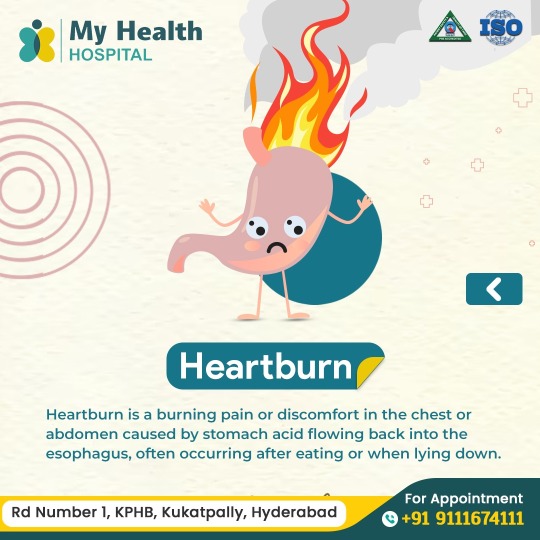
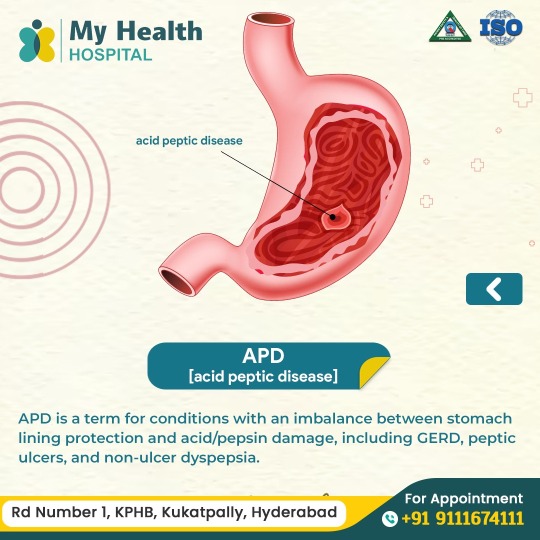
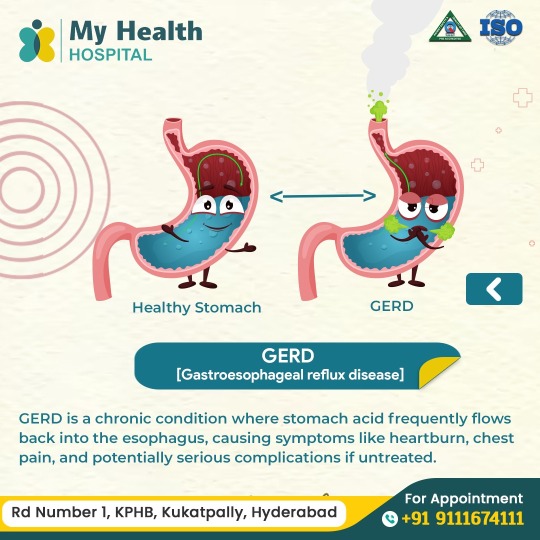
#heartburn#gerd#apd#gastroenterology#ulcers#stomach ulcers#acid peptic disease#best gastroenterologist in kphb hyderabad#best gastroenterology hospital in hyderabad#surgical gastroenterologist in india
0 notes
Text
When Should You Consult a Gastroenterologist?

A healthy digestive system is essential for overall well-being. However, according to Digestive Health Specialists in Bangalore, relentless activity can lead to digestive disorders impacting the system. If you experience unusual symptoms alongside persistent digestive issues, seeking the expertise of an accomplished Gastroenterologist is crucial. Here's when you should consider scheduling a consultation.
Who is a Gastroenterologist?
A Gastroenterologist is a specialist who treats medical conditions related to the digestive system, including the digestive tract, stomach, gallbladder, colon, liver, bile ducts, and pancreas. They are divided into two types: Medical Gastroenterologists (specializing in non-surgical treatments) and Surgical Gastroenterologists (focusing on surgical interventions).
When to see a Gastroenterologist?
Expert Advice on Digestive Health is essential if you observe the following symptoms indicating a potential digestive disorder.
Chronic Abdominal PainRecurrent Abdominal pain that does not improve with over-the-counter medicines or diet control.
Heartburn or Acid Reflux DiseaseOccasional heartburn that does not respond to antacid treatments and continues over time.
Persistent constipationLong-term constipation may indicate an underlying digestive issue.
Rectal Bleeding or Blood in StoolIgnoring rectal bleeding or blood in stool can lead to serious conditions like rectal cancer or gastrointestinal bleeding..
Irritable Bowel SyndromeAbdominal pain with fluctuating stool frequency, which can worsen if left untreated.
Timely intervention and management of digestive disorders can prevent complications and improve overall well-being. Hence, if you are suffering from relevant symptoms and wondering, “which is the best Gastroenterology clinic near me”, your search stops at United Hospital and our efficient team of experienced gastroenterologists.
#Bangalore gastro center#gastroenterologist near me#gastro doctor near me#stomach specialist doctor near me#gastroenterology treatment in Bangalore#best gynecologist for PCOS problem#best gastroenterology hospital in bangalore#gastroenterologist jayanagar#best hospital for gallbladder surgery in bangalore#gastroenterologist in bangalore
0 notes
Text
Signs and Symptoms: When to Seek Help for Blood in Vomit and Stool
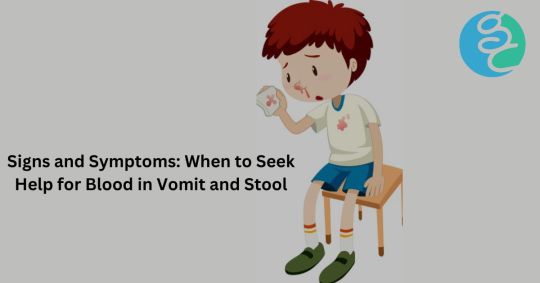
Discovering blood in vomit or stool can be alarming and should never be ignored. While it may indicate minor issues like hemorrhoids or gastritis, it could also be a sign of more serious conditions such as gastrointestinal bleeding or colorectal cancer. Recognizing the signs and symptoms associated with blood in vomit and stool is crucial for knowing when to seek medical assistance promptly.
Signs and Symptoms to Watch For:
Several signs and symptoms may accompany blood in vomit or stool, indicating potential underlying health issues:
Hematemesis (Blood in Vomit):
The bright red or coffee-ground-like appearance of blood in vomit
Nausea or vomiting, possibly accompanied by abdominal pain or discomfort
Weakness, lightheadedness, or fainting spells
Hematochezia (Blood in Stool):
Passage of bright red blood or maroon-colored stools
Rectal bleeding or blood streaks on toilet tissue
Abdominal pain, cramping, or bloating
Changes in bowel habits, including diarrhea or constipation
When to Seek Help:
It's essential to seek medical attention promptly if you experience any of the following concerning signs or symptoms:
Persistent or recurrent episodes of blood in vomit or stool
Large quantities of blood or clots in vomit or stool
Severe abdominal pain or discomfort
Dizziness, fainting, or weakness
Signs of dehydration, such as dry mouth, excessive thirst, or decreased urine output
History of gastrointestinal conditions or bleeding disorders
Age over 50, as the risk of colorectal cancer increases with age
Blood In Vomiting And/Or In Stool Treatment:
For individuals in Indore or nearby regions experiencing blood in vomiting and/or stool, prompt medical evaluation and treatment are available. Indore offers comprehensive healthcare services, including specialized facilities and experienced healthcare providers specializing in the diagnosis and treatment of gastrointestinal disorders.
Diagnostic Procedures:
Medical professionals in Indore may recommend various diagnostic tests to identify the underlying cause of blood vomiting in Indore
Endoscopy: Procedures such as upper endoscopy or colonoscopy allow direct visualization of the gastrointestinal tract to detect abnormalities or sources of bleeding.
Imaging studies: Imaging tests like CT scans or MRI scans may be performed to evaluate the extent of gastrointestinal bleeding and identify potential sources.
Laboratory tests: Blood tests may help assess blood counts, clotting factors, and markers of inflammation to aid in diagnosis and treatment planning.
Treatment Approaches:
The treatment of blood in vomiting and/or stool depends on the underlying cause and severity of the condition:
Medications: Depending on the diagnosis, medications such as proton pump inhibitors, antibiotics, or anti-inflammatory drugs may be prescribed to manage gastrointestinal conditions or infections.
Endoscopic interventions: In cases of gastrointestinal bleeding, endoscopic procedures like banding, cauterization, or injection therapy may be performed to stop bleeding or remove abnormal tissue.
Surgical intervention: Surgery may be necessary to repair gastrointestinal injuries, remove tumors, or address complications of severe bleeding.
Blood in vomit or stool should never be dismissed lightly, as it may signify underlying health issues ranging from minor to severe. Recognizing the signs and symptoms associated with blood in vomiting and/or stool and knowing when to seek medical help is essential for timely diagnosis and treatment. Whether seeking blood in vomiting and/or in stool treatment in Indore or elsewhere, prioritizing prompt medical evaluation can lead to better outcomes and improved overall health.
#best gastroenterologist in indore#gastroenterologist in indore#stomach specialist doctor in indore#top gastroenterologist in indore#stomach doctor indore#best gastro doctor in indore#best gastro hospital in indore#best gastroenterologist doctor in indore#best stomach doctor in indore#best gastroenterologist indore#best gastrologist doctor in Indore#gastro doctor in indore#gastro surgeon in indore#stomach specialist doctor in indore near me
1 note
·
View note
Text
Diarrhoea Treatment in Indore | Dr.Amit Bundiwal

Diarrhoea is a common condition that most people suffer with from time to time, and various treatments are available. If you are looking for the best Diarrhoea Treatment in Indore then contact us at 9302266078.
#best gastroenterologist doctor in indore#gastrology doctor in indore#liver doctor in indore#stomach doctor indore#gastro surgeon in indore#gastroenterologist doctor in indore#gastroenterologist in indore near me#indore gastroenterologist#stomach specialist doctor in indore near me#best gastro surgeon in indore#best gastroenterologist indore#best liver hospital in indore#gastro doctor in indore#liver specialist doctor in indore#best liver specialist doctor in indore#indore best gastrologist doctor#liver specialist dr in indore#liver specialist hospital in indore#best doctor for stomach in indore#best doctor in indore for stomach#best gastro doctor in indore#best gastrologist doctor in indore#best hepatologist in indore#best liver specialist in indore#gastro hospital in indore#liver doctor indore#liver specialist doctor indore#stomach specialist in indore#doctor for stomach in indore#gastro surgeon indore
0 notes
Text
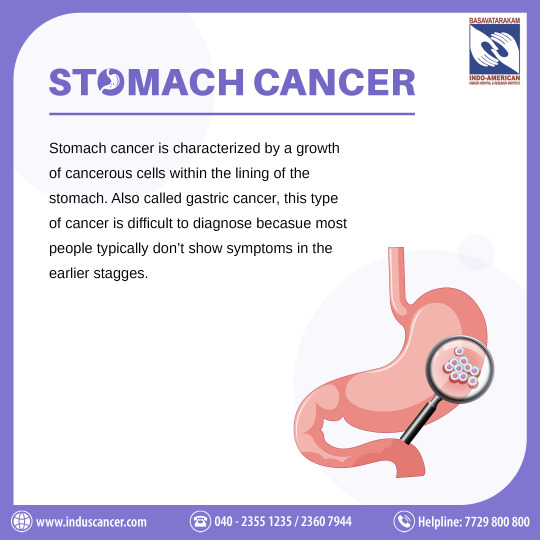
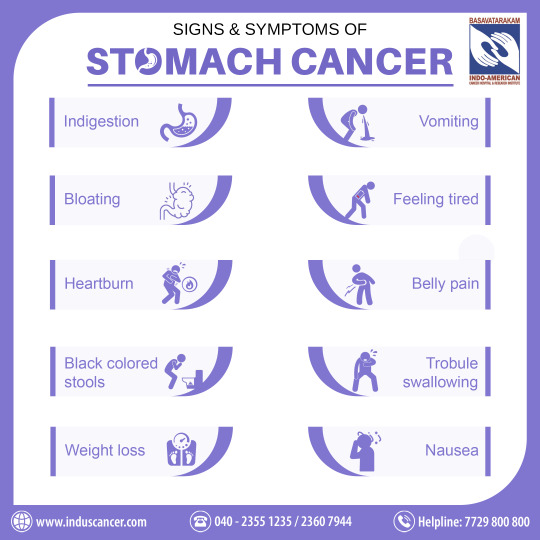
Stomach Cancer: Know the Signs and Seek Timely Treatment.
What is Stomach Cancer?
Stomach cancer, also known as gastric cancer, develops when abnormal cells grow uncontrollably in the lining of the stomach. It's a serious condition, but treatable with early detection.
Signs and Symptoms:
Early stages may not show any symptoms, but as it progresses, be aware of:
Indigestion: Heartburn, nausea, bloating
Loss of appetite and unexplained weight loss
Upper abdominal pain: Constant or intermittent
Difficulty swallowing food
Vomiting: May be blood-tinged
Fatigue: Due to anemia from blood loss
Why Early Detection Matters:
Early detection is crucial for effective treatment. If you or someone you know experiences these symptoms, consult with our expert oncologists at BIACH&RI for a thorough evaluation.
Don't ignore these signs! Early detection saves lives!
BIACH&RI: Your Partner in Fighting Cancer
At Basavatarakam Indo American Cancer Hospital, we are dedicated to providing comprehensive and compassionate care for cancer patients. Our experienced oncologists use advanced diagnostic and treatment approaches to ensure the best possible outcomes.
We offer:
Advanced diagnostic tools
Multidisciplinary treatment options: Surgery, chemotherapy, radiation therapy, targeted therapy, and immunotherapy.
Supportive care to manage side effects.
Dedicated team of specialists.
If you have concerns or questions about stomach cancer, reach out at: 040 - 2355 1235 / 7729 800 800
Best Cancer Hospital in India
#basavatarakam cancer hospital#best cancer hospital#indo american cancer hospital#best cancer hospitals in india#basavatarakam hospital#indo american hospital#basavatarakamcancerhospital basavatarakam#best cancer treatment in india#best cancer specialist in india#basavatarakam#stomach cancer
0 notes
Text
Tips for Relieving Stomach Pain

Relieving stomach pain can be a discomforting yet manageable experience with a few simple tips. Remember to stay hydrated and avoid carbonated or caffeinated beverages to prevent further irritation. These strategies can provide much-needed relief for a variety of stomach discomforts. Its essential to consult with gastro specialist in Coimbatore
0 notes
Text
Gastrointestinal Excellence in Hyderabad: Leading the Way at Gleneagles Global Hospital, Lakdikapul, Hyderabad
For those seeking a stomach doctor in Hyderabad, Gleneagles Global Hospital, located in Lakdikapul Hyderabad, is your premier destination for exceptional surgical gastroenterology care. Our dedicated team of highly skilled and compassionate specialists is committed to addressing a wide spectrum of gastrointestinal issues with precision and care. With a focus on surgical gastroenterology, we excel in advanced procedures that transform lives. From minimally invasive surgeries to complex interventions, our experts utilize cutting-edge technology to ensure the best outcomes. At Gleneagles Global Hospital Lakdikapul Hyderabad, your digestive health is our top priority, and we are here to guide you towards a healthier, happier life. Choose excellence, choose us.
#stomach doctor in Hyderabad#Best heart transplant hospital in Hyderabad#gastro doctor near me#gastro specialist near me
0 notes
Text
Best Neurosurgery Hospital in Gondia | Sahayog Hospital
Sahayog Hospital, located in Gondia, is renowned for its comprehensive neurology and neurosurgery services, catering to patients with a wide range of neurological conditions. Recognized as the best neurosurgery hospital in Gondia, Sahayog Hospital offers state-of-the-art facilities and expertise to deliver exceptional care to its patients. Specializing in brain tumor treatment, Sahayog Hospital has established itself as a leading neurosurgical hospital in Gondia, providing top-notch services to individuals in need of specialized neurological care.
#best hospital in Gondia for stomach#Cardiac Sciences at Hospital Hospitals#Best Heart Specialist in Gondia#best heart surgeon in Gondia#cardiac care services
0 notes
Text
Alcohol vs. cannabis vs. tobacco: Doctors answer which is worst for you
#water is wet article but yay free the weed man#I constantly tell my oncologists they should study it for stomach cancer#anything that helps you eat is good medicine#when I was in hospital after surgery I convinced them to give me thc pills#and they did#i know I spout off a lot but that medical starship is the best on the planet#saved me twice now#stomach cancer
0 notes
Text
Once you have shortlisted potential hospitals, schedule consultations with the surgical oncologists to discuss your case and receive a comprehensive evaluation.
#Best Surgeons For Stomach Cancer Treatment in India#Best Hospital for Stomach Cancer Treatment India#Best Price Stomach Cancer Treatment in India#Cost Benefits of Stomach Cancer Treatment in India#stomach Cancer treatment In India
0 notes
Text

Best Gastroenterology Hospital | Treatment for Digestive HealthMedanta
#Digestive hospital#best hospital for stomach problems near me#gastrocare liver & digestive disease center
0 notes